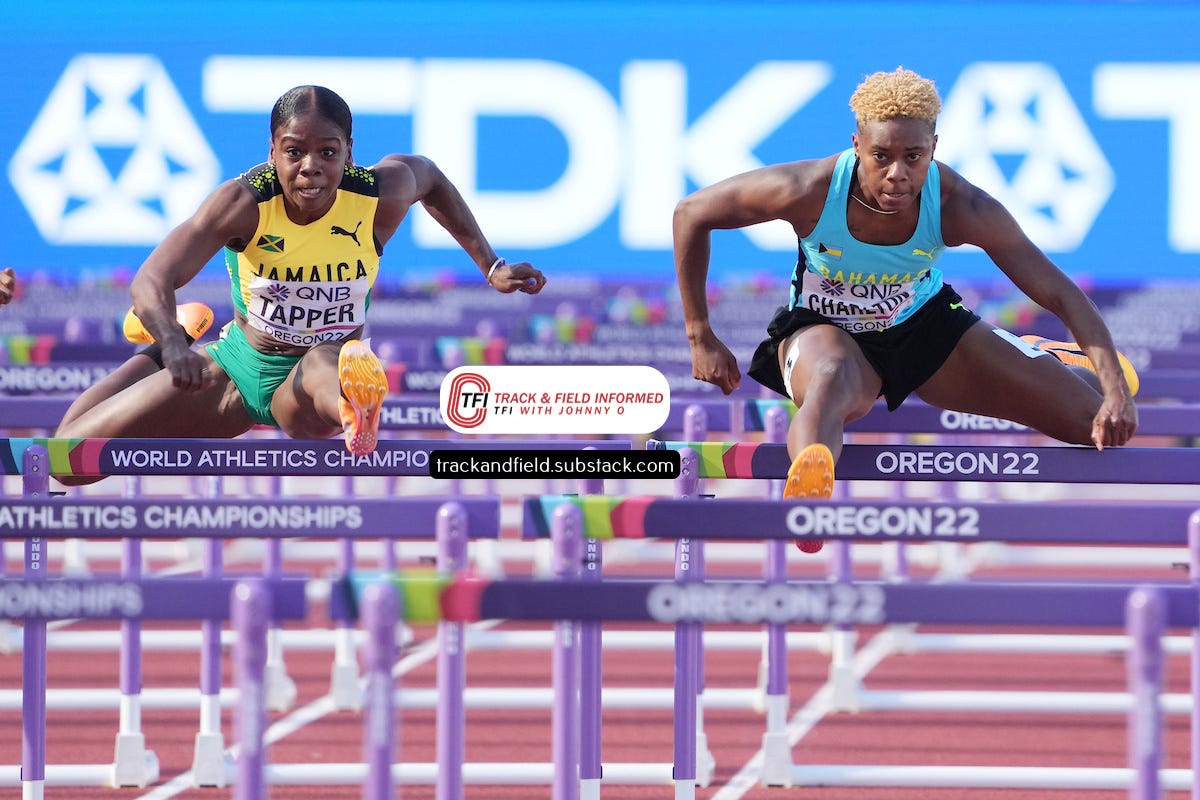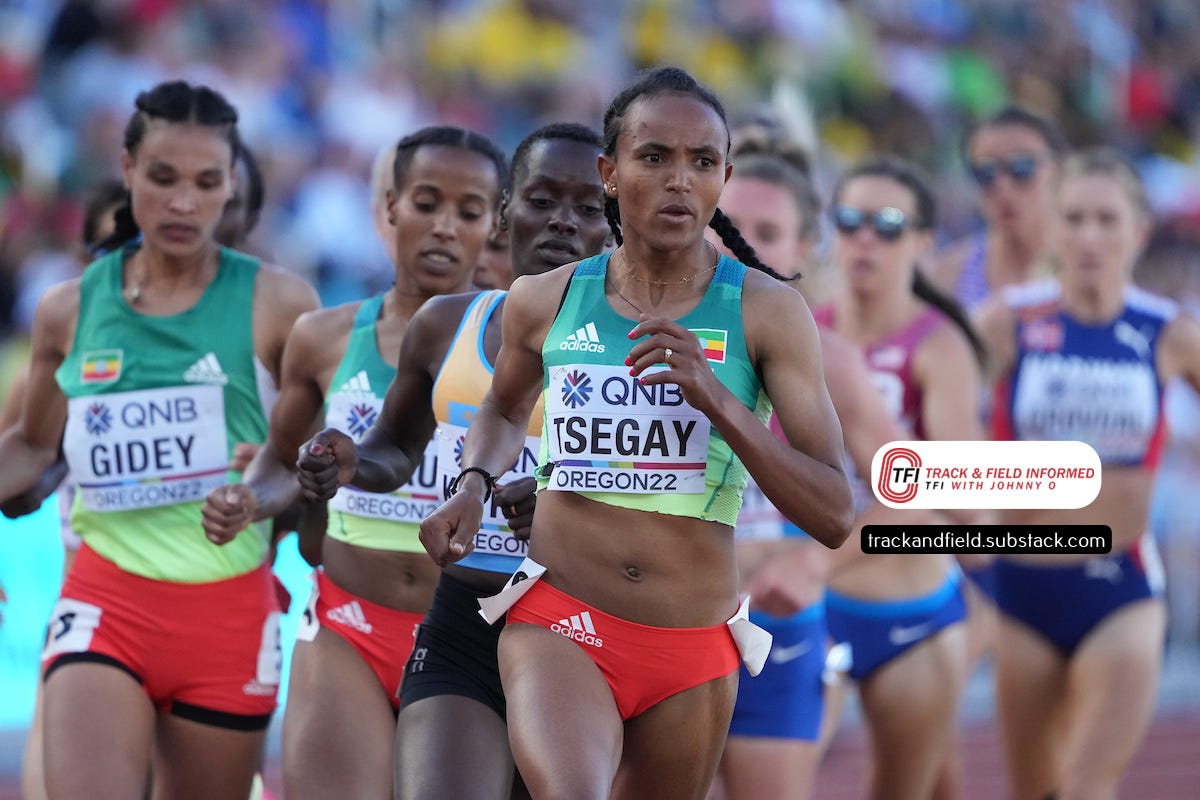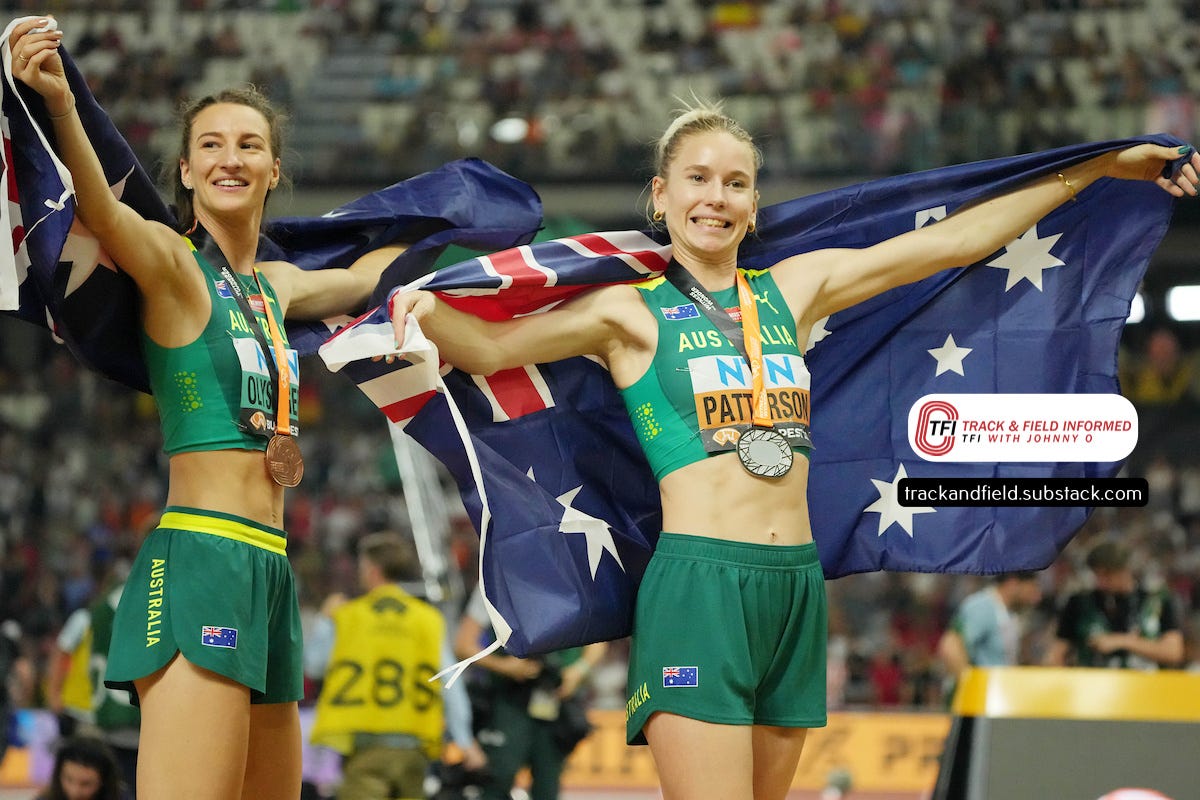Perfect timing
Charlton's season best gives her second consecutive title in World Indoor Champs

The women’s 60-meter hurdles event lived up to its billing in the World Athletics Indoor Championships in Nanjing, China, on Sunday.
That’s when, in a little less than eight seconds, Devynne Charlton of the Bahamas won her second consecutive global title in the deepest race in history.
The 29-year-old Charlton pulled off a bit of an upset when she clocked 7.72 seconds to finish a hundredth of a second ahead of second-place Ditaji Kambundji of Switzerland, and two hundredths in front of third-place Ackera Nugent of Jamaica, fourth-place Pia Skrzyszowska of Poland, and fifth-place Grace Stark of the U.S.
In addition, Nadine Visser of the Netherlands placed sixth in 7.76.
The clockings for Skrzyszowska, Stark, and Visser were the fastest ever for their respective places.
“It was a big deal for me to come here and show up, defend my title,” Charlton said in a World Athletics post. “It was a big goal for me. It wasn't looking great, but I trusted the people around me and I was able to pull it off.
“It's definitely super hard to defend a title at an event like this. The women always show up. To come away with a win against these ladies, it's really cool.”
Charlton had lowered the world record to 7.65 in last year’s World championships in Glasgow, Scotland, but she had entered that race with clockings of 7.67, 7.68, and 7.72 to her credit.
She had a season best of 7.83 — and no victories in three finals — when she settled in the starting blocks for her first-round heat on Sunday morning.
Athough she won that race in 7.94 before running 7.82 to place second in one of three semifinals, Stark, European champion Kambundji, and Skrzyszowska had run 7.72, 7.76, and 7.79, respectively, in their semifinal races.
Stark’s 7.72 effort had followed a 7.73 clocking in the first round and that had come a month after she had run a personal best of 7.75 in a heat of the USATF Indoor Championships before clocking 7.76 in the final while finishing second behind Olympic 100 hurdles champion Masai Russell, who ran a personal best of 7.74.

While Russell turned her attention to preparing for the outdoor season after that race, Stark was on a roll entering the final in Nanjing. And though her 7.74 effort was the third-fastest time of her career, it was only good enough to place fifth in a contest in which Charlton got off to one of her typically quick starts before holding off everyone else in the eight-competitor field.
Kambundji, who had lowered the European record to 7.67 in winning the continental title 16 days earlier, came the closest to catching Charlton. But it was clear that the Bahamian hurdler was in first place when the top six women dipped in unison as they flashed across the finish line.
In addition to the 60-meter hurdles, finals were contested in five other women’s events on the last day of the three-day meet.
Gudaf Tsegay of Ethiopia ran the fourth-fastest time in history in winning the 1,500, with other victories going to Prudence Sekodiso of South Africa in the 800, Nicole Olyslagers of Australia in the high jump, unheralded Claire Bryant of the U.S. in the long jump, and an American quartet that was anchored by Alexis Holmes in the 4 x 400 relay.
Tsegay is one of the most talented and versatile runners in the world as she ranks third, first, and third, respectively, on the all-time performer lists in the 1,500, 5,000, and 10,000 meters.
In addition, she won the 5,000 and placed second in the 1,500 in the 2022 World outdoor championships in Eugene, Oregon, before winning the 10,000 in the 2023 global championships in Budapest, Hungary.
However, she had severely underperformed in the Olympic Games in Paris last summer when she placed ninth in the 5,000, sixth in the 10,000, and 12th in the 1,500.
But she had run the second-fastest short track time in history in the 1,500 with a 3:53.92 clocking in Lievin, France, last month and she wasn’t far off that mark on Sunday as her winning time of 3:54.68 was a meet record and left her four-plus seconds ahead of compatriot Diribe Welteji, who finished second in 3:59.30.
Georgia Hunter Bell of Great Britain matched her Olympic bronze medal performance in the 1,500 with third-place time of 3:59.84, followed by the Oceania record of 4:00.84 for fourth-place Georgia Griffith of Australia.
Tsegay, who has now run the four fastest times ever in the 1,500 indoors, was nearly a second ahead of second-place Welteji when she went through 400 meters in 60.50 seconds and that gap continued to expand as she passed 800 meters in 2:03.44 and 1,200 in 3:07.99.
“It was not an easy race,” Tsegay said in a World Athletics post. “This was a fast time, so I'm very happy about that.
“Athletes go through ups and downs, injuries, challenges – it's no problem. I prefer the indoors. For outdoors, I'll do the 800m or 10,000m, but indoors I like the 1500m.”

Sekodiso won the 800 in a South African record and yearly world-leading time of 1:58.40 and she was followed by silver medalist Nigist Getachew of Ethiopia in 1:59.63 and bronze medalist Patricia Silva of Portugal in in 1:59.80.
Silva, whose father, Rui Silva, won the men’s 1,500 in the 2001 World indoor championships in the Portuguese capital of Lisbon, finished a hundredth of a second ahead of Audrey Werro of Switzerland, who appeared to have the bronze medal locked up with 30 meters left in the race.
Getachew had been in first place when she came through 200 meters in 26.62, 400 in 55.88, and 600 in 1:26.93. Sekodiso ran a little off the hot early pace, but she was in second place with a lap to go and she surged past Getachew near the end of the final backstretch.
Defending champion Tsige Duguma of Ethiopia finished sixth — and last — in 2:06.76 after being in second place after the first two laps of the race and in third as she started the bell lap.
“It's a surprise,” Sekodiso said in a World Athletics post. “You have the world's fastest in the race, but I believed that I could make it, and to make it and grab that gold medal, I'm proud. I did dream of this, I've been working so hard for this. We have a long season ahead and I believe there's still more to come.”
The women’s high jump had been billed as a showdown between defending champion Olyslagers and Olympic champion and world record-holder Yaroslava Mahuchikh of Ukraine. But it ended up being an 1-2 finish for Australia as Olyslagers and 202 World outdoor champion Eleanor Patterson each cleared 1.97 meters (6 feet 5½ inches) on their first attempts, with the former winning the gold medal because she had fewer total misses during the competition than her teammate.
Mahuckikh and Angelina Topic of Serbia each cleared 1.95 (6-4¾), but Mahuckikh finished third because she cleared that height on her first attempt and Topic made it on her second try.
“This is the first time I’ve come from a gold medal position to try and defend something outside of Australia,” Olyslagers said in a World Athletics post after winning the title in her first meet of the year. “I knew that if I wanted to jump as high as I wanted, to be as competitive as I wanted, I needed to do things outside of my normal comfort zone. I needed to do something new, like start a world championships as my first competition of the season.
“I was really inspired by Yaroslava's world record attempts last year, and how she changed her run-up. So, I was jumping with a new run-up today. I want to jump as high as Yaroslava – if I want to be competitive, I need to be trying and changing things up.”
Bryant’s victory in the long jump made her the most surprising gold medalist, male or female, during the meet as the set two personal bests during the competition, topped by her winning effort of 6.96 (22-10).
She was followed by Annik Kalin of Switzerland at 6.83 (22-5), bronze medalist Fatima Diame of Spain at 6.72 (22-¾) and fourth-place Plamena Mikova of Bulgaria at 6.63 (21-9).

Bryant was competing in her first global title meet after having finished second in last year’s NCAA indoor and outdoor championships during her senior year at the University of Florida. But she appeared to be more relaxed and less stressed about her surroundings than anyone else in the field as she smiled frequently in between her jumps, as well as when she was preparing to begin her approach on the runway.
She took the lead with an effort of 6.76 (22-2¼) in the first round and leaped 6.72 (22-¾) in the second before adding two centimeters to her personal best with an effort of 6.90 (22-7¾) on her third attempt.
She fouled on her fourth attempt, but upped her personal best to 6.96 (22-10) in the fifth round before fouling in the sixth.
“If someone had told me that I would walk away from Nanjing with the title, I would thank them for that vote of confidence,” Bryant said in a World Athletics post. “I didn't come in with expectations, I just wanted to enjoy the moment. Every part of this is so cool.
“I woke up at like 4:45 am this morning, I felt like it was Christmas morning and I knew there was something waiting for me. You can always surprise yourself in track, and I think that's what's so great about this sport. Seven metres is coming, for sure. I was working on it on that last jump. It was just a little foul, but it's okay – I can't complain.”
There were only five entrants for the 4 x 400 relay and the heavily-favored U.S. team of Quanera Hayes, Bailey Lear, Rosey Effiong, and Alexis Holmes won the event by four-plus seconds with a time of 3:27.45.
Poland placed second with in 3:32.05, followed by Australia in 3:32.65, China in 3:38.56, and Sri Lanka in 3:40.62.
Poland held a slight lead over the U.S. after Hayes was credited with a split of 52.28 on her opening leg, but the squad was in first place after Lear ran 52.05 on her carry and Effiong blew the race open when she ran 51.65 on the third leg.
Holmes, the silver medalist in the 400 on Saturday, capped the victory with a 51.47 anchor leg.
“We’ve been running with each other since college, so we definitely get to know each other a lot,” Holmes said in a World Athletics post. “We don’t get to see each other that much during the year, but every time we get together the goal is just to win. That’s the highlight of the week for sure, another medal for team USA.”
The U.S. won a meet-high 16 medals, including six gold medals, during the three-day competition. Australia had the second most medals with seven, followed by Ethiopia with five.
You can click here for complete results from the meet.



